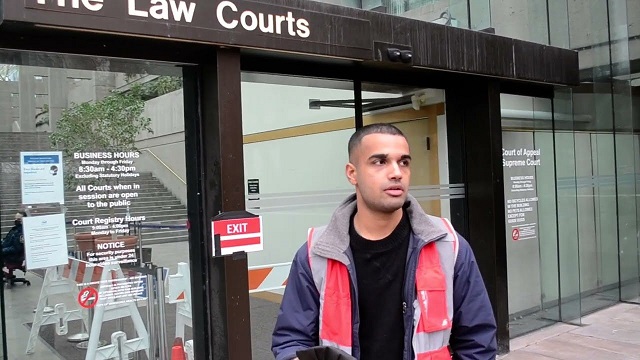Alberta
Project Confederation group urging UCP Leadership hopefuls to consider Alberta first

Article submitted by Josh Andrus of Project Confederation
The current Alberta government has certainly talked the talk about standing up to the federal government much better than previous administrations.
Actions speak louder than words, though, and action has been sorely lacking.
It has been more than nine months since Albertans strongly voiced their opinion in favour of abolishing equalization from the Constitution.
In the aftermath, the muted response from the federal government speaks volumes – when we called, nobody answered.
It has, therefore, become glaringly obvious that the equalization referendum was not enough to convince Ottawa to come to the table and initiate constitutional talks.
It’s also important to make sure we keep focused not just on any one particular problem, but on the core issue itself – the jurisdictional fight between the federal government and the provinces.
That’s why we need to effectively communicate to every Albertan three things:
- How the Canadian federation is supposed to work
- How it’s actually being run at the moment
- How to fix the problem and get it back to how it should be
1 How Canada is supposed to work is misunderstood (or misrepresented, perhaps deliberately so) all the time by the media, academics, politicians, and many others.
Canada is designed as a federation, and that word actually means something.
A federation is a union of (at least partially) self-governing states or provinces.
The creation of Canada didn’t merge a bunch of provinces, territories, colonies and countries into a single new entity.
Canadian confederation created a system where there was a clear division of powers between the federal government and the provinces.
Many (especially in Ottawa) think that the federal government sits “above” the provinces, suggesting it is more important, more powerful, and can tell the “lower” level of government what to do.
In fact, the federal government has complete sovereignty over the issues they were given jurisdiction over, while the provincial governments have complete sovereignty over the issues they were given jurisdiction over.
In short, Alberta – and all the other provinces – are supposed to be equal partners in this country, not subservient to continuously hostile federal governments in Ottawa.
2 Unfortunately, over time, the federal government has exerted jurisdiction over things it’s not supposed to control, and because the federal government gets to appoint federal judges, the federal judges have tended, also over time, to let the federal government get away with this.
Historically, this has involved ever-increasing federal control of natural resources and environmental concerns and the current federal government continued this trend, spending the past seven years trampling all over the constitutional jurisdiction of Alberta – through Bill C-69, Bill C-48, the carbon tax, and more.
Worse, they haven’t just completely ignored Alberta’s complaints about this overreach – they’ve actually continued to make things worse.
Since the equalization referendum, the federal government has continued to roll out even more new federal policies that will take over Alberta’s jurisdiction on a wide range of issues – childcare funding, healthcare rules, agriculture and fertilizer constraints, environment regulations, and more.
The current relationship between federal and provincial governments in Canada is not how it is supposed to be, and it isn’t sustainable.
Something has to give.
3 Given this approach by the federal government, it has become abundantly obvious that the equalization referendum was not enough to convince Ottawa to come to the table and negotiate some kind of compromise with Alberta.
Alberta must stand up for itself.
Alberta needs to start saying no to Ottawa, not just asking Ottawa nicely to change their mind.
Alberta must also demand that the Canadian Constitution be re-opened.
If the federal government’s judges are willing to twist the words in the Constitution so much that they become meaningless, then we need to re-write sections of the Constitution to make it crystal clear, in plain language, that the federal government’s current actions will not be tolerated or permitted any longer.
At a minimum, these changes would involve:
- Abolishing equalization
- A fair House of Commons
- An equal Senate
- Unrestricted free trade (including pipelines)
- Complete provincial control over resources
Yes, this would be a big change from the current status quo.
But, let’s be clear, that’s only because things have drifted so far from what they are supposed to be.
Albertans are not actually asking for anything unique or radical.
We are simply asking for the federal government to follow the rules of the Constitution as they are written, not as they’ve been twisted to mean since.
And if the federal government won’t even agree to something as simple as that, well… at least we’ll have our answer then
Regards,
Josh Andrus
Executive Director
Project Confederation
PS: If you’re in a position to contribute financially to our important work fighting for Alberta, you can make a donation here.
Alberta
Former senior financial advisor charged with embezzling millions from Red Deer area residents

News release from Alberta RCMP
Former senior financial advisor charged for misappropriating nearly $5 million from clients
On April 4, 2024, the RCMP’s Provincial Financial Crime Team charged a Calgary resident for fraud-related offences after embezzling millions of dollars from his clients while serving as a senior financial advisor.
Following a thorough investigation, the accused is alleged to have fraudulently withdrawn funds from client accounts and deposited them into bank accounts he personally controlled. A total of sixteen victims were identified in the Red Deer area and suffered a combined loss of nearly $5 million.
Marc St. Pierre, 52, a resident of Calgary, was arrested and charged with:
- Fraud over $5,000 contrary to section 380(1)(a) of the Criminal Code; and,
- Theft over $5,000 contrary to section 344(a) of the Criminal Code.
St. Pierre is scheduled to appear in Red Deer Provincial Court on May 14, 2024.
“The ability for financial advisors to leverage their position to conduct frauds and investment scams represents a significant risk to the integrity of Alberta’s financial institutions. The investigation serves as an important reminder for all banking clients to regularly check their accounts for any suspicious activity and to report it to their bank’s fraud prevention team.”
- Sgt. John Lamming, Provincial Financial Crime Team
The Provincial Financial Crime Team is a specialized unit that conducts investigations relating to multi-jurisdictional serious fraud, investments scams and corruption.
Alberta
Political parties will be part of municipal elections in Edmonton and Calgary pilot projects

Strengthening Alberta’s local elections
Alberta’s government is introducing legislation to ensure Albertans can rely on transparent, free and fair elections, and municipally-elected officials have clearer accountability measures.
In a democratic society, Albertans expect their local elections to be free and fair, and their elected officials to be held to account by clear rules that govern their local councils. The Municipal Affairs Statutes Amendment Act proposes amendments to the Local Authorities Election Act (LAEA) and the Municipal Government Act (MGA) to add greater transparency to local election processes and ensure local councils and elected officials continue to remain accountable to the citizens who elected them.
“Our government is committed to strengthening Albertans’ trust in their local governments and the democratic process that elects local leaders. The changes we are making increase transparency for Alberta voters and provide surety their votes will be counted accurately. We know how important local democracy is to Albertans, and we will work with local authorities to protect and enhance the integrity of local elections.”
Local Authorities Election Act
Albertans expect free and fair elections and that’s why it’s important we strengthen the rules that govern local elections. To strengthen public trust in local elections, Alberta’s government will eliminate the use of electronic tabulators and other automated voting machines. All Albertans should be able to trust the methods and results of local elections; requiring all ballots to be counted by hand, clarifying rules and streamlining processes for scrutineers will provide voters greater assurance in the integrity of the results.
All eligible Albertans should be able to vote in local elections without impediment. Alberta’s government will limit the barriers for eligible voters to cast a ballot by expanding the use of special ballots. Currently, special ballots can only be requested for very specific reasons, including physical disability, absence from the municipality, or for municipal election workers. By expanding the use of special ballots, the government is encouraging more voter participation.
Amendments in the Municipal Affairs Statutes Amendment Act would increase transparency in local elections by enabling political parties at the local level. Political parties would be enabled in a pilot project for Edmonton and Calgary. The act will not require candidates to join a political party in order to run for a local or municipal office, but will create the opportunity to do so.
In addition, proposed changes to the Local Authorities Election Act would allow municipalities the option to require criminal record checks for local candidates, thus increasing transparency and trust in candidates who may go on to become elected officials.
Municipal Government Act
The role of an elected official is one with tremendous responsibility and expectations. Changes proposed to the Municipal Government Act (MGA) will strengthen the accountability of locally elected officials and councils. These include requiring mandatory orientation training for councillors, allowing elected officials to recuse themselves for real or perceived conflicts of interest without third-party review and requiring a councillor’s seat to become vacant upon disqualification.
If passed, the Municipal Affairs Statutes Amendment Act will also unlock new tools to build affordable and attainable housing across Alberta. Proposed amendments under the MGA would also create more options for municipalities to accelerate housing developments in their communities. Options include:
- Exempting non-profit, subsidized affordable housing from both municipal and education property taxes;
- Requiring municipalities to offer digital participation for public hearings about planning and development, and restricting municipalities from holding extra public hearings that are not already required by legislation; and
- Enabling municipalities to offer multi-year residential property tax exemptions.
Municipal Affairs will engage municipalities and other partners over the coming months to hear perspectives and gather feedback to help develop regulations.
Quick facts
- The LAEA establishes the framework for the conduct of elections in Alberta municipalities, school divisions, irrigation districts and Metis Settlements.
- The MGA establishes the rules governing the conduct of local elected officials once on council, as well as the overall administration and operation of municipal authorities in Alberta, including any policy those authorities may wish to implement.
Related information
-

 Censorship Industrial Complex15 hours ago
Censorship Industrial Complex15 hours agoJordan Peterson, Canadian lawyer warn of ‘totalitarian’ impact of Trudeau’s ‘Online Harms’ bill
-

 Alberta1 day ago
Alberta1 day agoAlberta rejects unconstitutional cap on plastic production
-

 COVID-192 hours ago
COVID-192 hours agoPfizer reportedly withheld presence of cancer-linked DNA in COVID jabs from FDA, Health Canada
-

 Alberta2 days ago
Alberta2 days agoRed Deer Doctor critical of Alberta’s COVID response to submit report to Danielle Smith this May
-

 Alberta22 hours ago
Alberta22 hours agoAlberta official reveals ‘almost all’ wildfires in province this year have been started by humans
-

 Fraser Institute2 days ago
Fraser Institute2 days agoBill Maher is right about Canadian health care
-

 Bruce Dowbiggin21 hours ago
Bruce Dowbiggin21 hours agoCome For The Graduate Studies, Stay For The Revolution
-

 Business1 day ago
Business1 day agoTaxpayers criticize Trudeau and Ford for Honda deal









